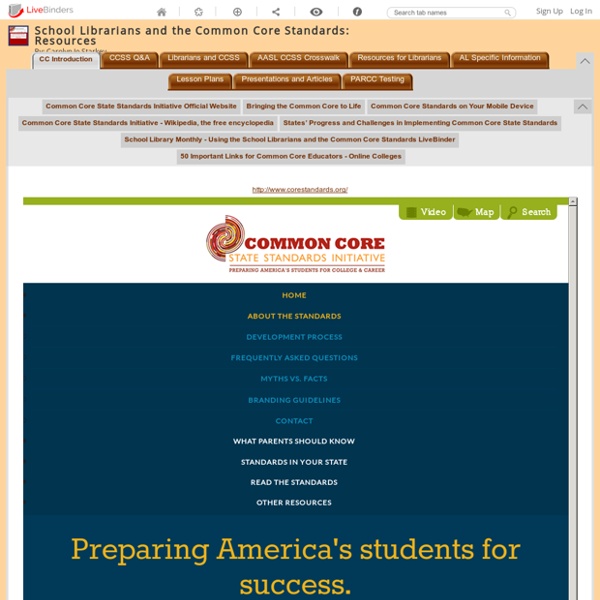



Common Core and School Librarians School Library Monthly/Volume XXVIII, Number 1/September-October Common Core and School Librarians: An Interview with Joyce Karon by Pamela K. Kramer Pamela K. The Common Core Standards (CCS) are at hand! I asked Joyce Karon, a former school librarian, district coordinator, former member of the Illinois State Board of Education and the Illinois Board of Higher Education, to discuss these standards with me. Q: What are the Common Core Standards? A: The simple answer is that they are academic standards for K-12 education designed to prepare students for college and career readiness. Q:How are the CCS similar to or different from other standards? A: To begin with they are clearer. Q: What do the standards mean for students, for teachers? A: We all agree that students have a right to a good education. For teachers there are interesting implications. Another implication for teachers is that it will now be possible for administrators to identify and measure what successful teaching looks like.
S.O.S. for Information Literacy This is a 40 minute lesson that can take place in the library media center or the classroom. If it takes place in the classroom, the database searching section of the lesson may need to be modified or omitted. Introduction 1. 2. 3.The LMS explains that these terms are used to narrow or expand the results in online searching. Body 1. 2. 3. 4. 5. 6. 7. 8. 9. 10. 11. Conclusion 1. 2.
What Every New Media Specialist Needs to Know: These 10 tips can help your career get off to a great start These 10 tips can help your career get off to a great start Illustration by Steve Wacksman It’s not easy being a media specialist, especially if you’re new to the profession or you’ve switched schools and you’re suddenly the new kid on the block. Let’s face it, many administrators and teachers don’t understand what we do. Take a deep breath! 1. 2. 3. 4. 5. 6. 7. 8. 9. 10.
Crosswalk of the Common Core Standards and the Standards for the 21st-Century Learner Skip to main content ALA User Menu Search form A Division of the American Library Association You are at: ALA.org » AASL » Learning Standards & Program Guidelines » Learning Standards & Common Core State Standards Crosswalk Share this page: Share on Facebook Share on Google+ Share on Pinterest Print Learning Standards & Common Core State Standards Crosswalk The following pages include tables that help school librarians learn how the AASL Standards for the 21st-Century Learner and the Common Core State Standards align. English Language Arts Reading Standards for Literacy in History/Social Studies Reading Standards for Literacy in Science and Technical Subjects Writing Standards for Literacy in History/Social Studies, Science, & Technical Subjects Mathematics Lessons submitted as part of the Standards for the 21st-Century Learner Lesson Plan Database contain an automatic crosswalk between AASL learning standards and the Common Core State Standards. © 1996–2015 American Library Association
S.O.S. for Information Literacy Introductory lesson plans for learning to use the typical school library act as templates adaptable to any subject area. Classes form detective agencies, adopt spy names, and sleuth for clues to where information resides in library resources. Intended as a fun additional component to insert in traditional lesson plans, the skills required to complete these exercises increase student information vocabularies, and taps into and relies upon student motivation, multiple intelligences and different learning styles, and social cognitive awareness. These Information skills applications are designed to adapt to almost any subject area. Topics are assigned by teachers in any subject area or selected by students, then plugged-in to the template. Students will be able to: 1. Super-sleuthing for Information Resources in Your School Library.pptPartner's log-book.pptTeacher's guide.docHints and clues.doc I. d.) II. b.) c.) d.) IV. b.) Grading/Assessment a.) b.)
Free Technology for Teachers Rigor is NOT a Four-Letter Word S.O.S. for Information Literacy This lesson will familiarize seventh grade students with the Library Media Center in their new school. The students will learn how to access and use tools available to locate resources, materials, and information. The students will have the opportunity to independently and successfully complete an assignment using their literacy information skills and the LMC. Materials: Computer access to LMC website, OPAC, district databases, and search engines Worksheet [see Supporting Files] pencils/pens
Black History Month Resources One of my favorite units to teach is Black History Month. I love to study about the contributions by famous African Americans. My students are always surprised by how many things they use that were invented by African Americans. Garrett Morgan invented the traffic light. Benjamin Banneker invented the Farmers Almanac. P.B. William Purvis invented the fountain pen. Dr. George Crum invented the potato chip. Dr. Click HERE if you'd like to visit my TPT store. I found some more resources that will enrich this unit. (click) Garrett Morgan (video) Benjamin Banneker (video) George Crum (video) Dr. I found some books that would enrich your Black History month unit.
Answering questions about library impact on student learning This essay reports on a project which evaluated the Understanding Library Impacts (ULI) protocol, a suite of instruments for detecting and communicating library impact on student learning. The project was a dissertation study conducted with undergraduates enrolled in upper-level and capstone history classes at six U.S. colleges and universities in 2011. My first essay for In the Library with The Lead Pipe introduced the protocol and provided background on the approach. This essay uses selected results from the 2011 project to demonstrate how the protocol works and suggests ways readers can get involved with future ULI projects. High expectations for higher education These are trying times in U.S. higher education. Support for teaching and learning is at the heart of most academic library mission statements. Just what outcomes do libraries influence? In my opinion, doing nothing is not an option. The ULI protocol is designed to meet this challenge. What are student learning outcomes?